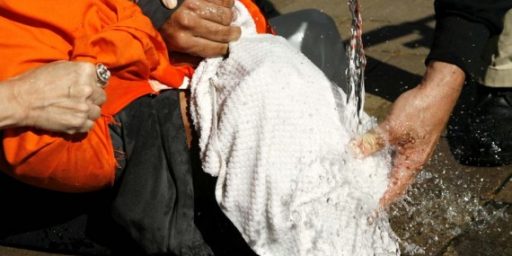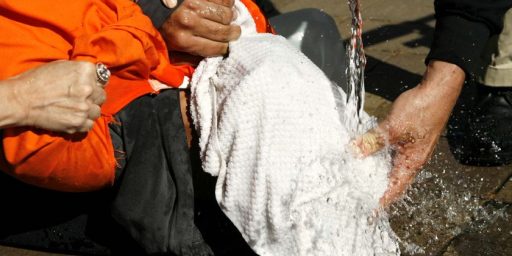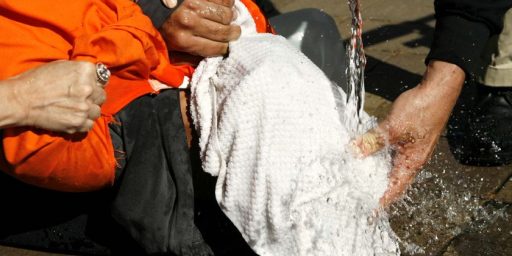Torturing Khalid Shaikh Mohammed Worked
The Chicago Tribune ran a chilling piece in yesterday’s edition by John Crewdson bolstering the case for torturing terrorist suspects.
Moral and legal aspects aside, conventional wisdom is that torture simply isn’t practical: that someone who is being tortured will say anything to make the torture stop, and that information gleaned through torture is therefore not reliable. Some former military and intelligence officers say, however, that physically aggressive interrogation techniques that some human-rights groups consider torture can be effective in the short term. When asked for specifics, the technique they cite is “waterboarding,” in which water is poured over a subject’s face to create the sensation of drowning.
Consider Khalid Shaikh Mohammed, the 39-year-old former Al Qaeda operative who was the Sept. 11 mastermind and bearer of many Al Qaeda secrets. If anyone had a motive for remaining silent, it was the man known to terrorism investigators as “KSM.” But not long after his capture in Pakistan, in March 2003, KSM began to talk. He ultimately had so much to say that more than 100 footnoted references to the CIA’s interrogations of KSM are contained in the final report of the commission that investigated Sept. 11. Not that everything KSM said was believable. But much of his information checked out in separate questioning of other captured Al Qaeda figures.
What made KSM decide to talk? The answer may be waterboarding, to which KSM was subjected on at least one occasion, according to various accounts. Intelligence operatives say that while waterboarding can break through a suspect’s initial resistance, it isn’t effective for long-term interrogation. Once a suspect begins to communicate, however, an interrogation specialist can put into action a wide range of far more subtle techniques, which include playing to a subject’s ego or pretending to be his friend.
It could not be learned exactly when KSM was waterboarded or whether the technique was used more than once. But only 12 days after being captured in Pakistan, on March 1, 2003, KSM made his first reported major revelation.
Crewdson follows this with a detailed timeline gathered from the 9/11 Commission’s final report and ends, “The commission’s report was published in July 2004. But for all the world knows, KSM may be talking still.”
This is good news in the war on terror but bad news in the fight against torture. As I noted earlier this month,
I am able to maintain my opposition to torture not only on philosophical grounds at least partly because of my practical sense that it is ineffectual–indeed, harmful–on public policy grounds. Those who believe that torture works may, understandably, be willing to rationalize away their moral objections.
Success stories only strengthen their case. This is only one case and we don’t really know to what degree waterboarding contributed to breaking Mohammed. It nonetheless subtly shifts the balance of the argument.
Update: Robert Prather and Pat argue that waterboarding isn’t torture because, “It doesn’t involve any permanent damage of any kind” and “It does no physical harm and leaves no scars,” respectively.
The CONVENTION AGAINST TORTURE and Other Cruel, Inhuman or Degrading Treatment or Punishment, to which the United States and United Kingdom are signatories, defines it thusly:
For the purposes of this Convention, torture means any act by which severe pain or suffering, whether physical or mental, is intentionally inflicted on a person for such purposes as obtaining from him or a third person information or a confession, punishing him for an act he or a third person has committed or is suspected of having committed, or intimidating or coercing him or a third person, or for any reason based on discrimination of any kind, when such pain or suffering is inflicted by or at the instigation of or with the consent or acquiescence of a public official or other person acting in an official capacity. It does not include pain or suffering arising only from, inherent in or incidental to lawful sanctions.
Whether one believes waterboarding ought be within bounds when dealing with terror suspects, it is certainly “torture.”
Related at OTB:
-
Bush Accepts Torture Ban
Boot Camp as Torture
Torture: A Bad Idea
It̢۪s the Torture, Stupid
Senate Compromise on Detainee Rights, Torture
Canadian Court Allows Bush Torture Prosecution
U.K. to Deport Islamist Radicals, Possibly Even Citizens
Another Prison Torture Scandal
Guantanamo: Torture or No Torture?
Gitmo Analogies
Truth Extraction: Honey Beats Vinegar
In Defense of Rendition
Outsourcing Torture






In an unconventional war such as this I imagine we will have to do things we would rather not do. I can’t believe our military or intelligence personel look forward to “agressive interrogation”.
Doctors sometimes have to take steps that injure the body in order to save the patient. Amputations may save a life but I am sure the doctor hates to take that step, but he must.
A moral society like our’s dislikes torture even in it’s mildest forms, but we must come to the realization that war is an ugly business. In these cases saving lives by extracting intelligence is an ugly business.
These techniques should be monitored closely while being used but we should continue the use if even slightly effective. It could save the life of some you know or love.
Declaring “success” on the basis of one incident is logically flawed, isn’t it?
On a practical, amoral, level torture has to give you more good information than bad, and cause more positive after-affects out there in the world than negative after-affects.
One incident hardly makes that case … to the discerning reader.
(I, like you, oppose it for both moral and practical reasons.)
BTW Steven, isn’t torture the kind of thing that we would have considered “dishonor” a generation ago? Our heros, our icons in our movies certainly did not torture. The bad guys did. Why do you suppose that changed?
One can argue the morality of torture and if we should use it some or not at all day. However the argument that torture can’t and doesn’t work is just simply wrong. Can torture result in receiving bad or incorrect data, yes but that happen in any interrogations. There are techniques to shift though “good†and “bad†information. To use the phony saying that torture doesn’t work just hurts one’s argument against it. People tend to think that if your talking points are full of lies then you arguments must be full of lies.
Begs the question. How would we know that KSM wouldn’t have spilled under professional interrogation?
But “not long after” his capture, he was tortured.
Cutting a knot certainly undoes it, but that doesn’t prove that you couldn’t have untied it just as well.
Odo is correct, a generation ago we would have recoiled at the thought of our soldiers torturing the enemy captives. So why is it different now?
The our vision of the world has changed. We used to believe that there was hope for the world through the UN and that wars would be fought with the Geneva Convention agreements being followed but we learned that our enemies tortured on a regular basis and that the UN didn’t care about such things. Heck, genocide? They can’t let that interfere with this weekend’s diplomatic dinner parties.
We found out our heros were human. The press didn’t expose minor incidents to us during the previous wars. Maybe not even major ones. The press now revels in making our military look bad. What better way to get that Pulitzer.
I recall watching ‘Band of Brothers’and seeing our troops (I can’t remember if it was american or british troops) shoot german soldiers as quick as they could capture them. Fiction, but probably closer to what really happened over there.
In todays information environment we see more than we used to, good and bad. No longer is everything black and white, we know the world is made up of shades of gray.
Even in the old days I would expect understanding for the soldier who beats a prisoner for information in order to save his buddies.
Times have changed, the world has changed, and we have changed.
Not particularly. Usually, it only takes once to make a difference.
Perhaps you weren’t being told what really went on, eh?
Yeah. Don’t some people suggest that we went to war, in part, because “once” this sort semi-torture gave us bad information on WMDs?
There is a crucial difference between rank hypocracy, and having some of your members fall short of your goals.
When the society believes X, and some guys in government do Y, society hasn’t changed. They still believe the same things. They can still demand that government return to the fold.
The question here is where we should put our moral compass, and what standard we set for ourselves as a society. I’d rather not see us start down any slippery slopes …
It’s interesting the kind of crap people will make up to fit their ideology. (ODO)
First, we did not torture any one into admitting Saddam had WMD. The issue was bad intelligence, regardless of continued inspection and monitoring efforts by the international community as a whole.. regardless of information from defectors… regardless of our aerial surveillance efforts… Saddam was believed to have WMD precisely because of his continued interference with these efforts, his continued violation of UN Resolutions, his sabre rattling, and his support for international terror.
Incidentally, it’s hypocrisy, not hypocracy. (Although I’m not above a type-o myself- if that’s what is was). Maybe you’re just so excited about Iraqi demoCRACY that you couldn’t help yourself.
Second, the slippery slope argument holds no water. If we applied this to all facets of life, no one would ever do anything! The gruesome fact is this: In war, it is killed or be killed at any cost. We can take the higher ground (i.e. not chopping heads off), but it is still a deadly conflict with deadly consequences.
You don’t really believe that if we water-board KSM that tomorrow the Guvmint will be going around knocking on doors and inserting bamboo shoots under fingernails to collect information, do you?
When you read the first story I type after waking up, you get a few funny words and sentences 😉
I was thinking of this, on pre-war, but “WMD” only in the sense of “chemical weapons”:
http://volokh.com/posts/1134168811.shtml
On “slippery slopes” … I can only say it was a lot easier to be proud to be an American and a Republican in the Reagan years.
Well, if the purpose of interrogating terrorists is to prove our prowess, then that’s a telling point.
But I thought the point of interrogating captured terrorists was to, y’know, prevent terrorist acts.
Maybe I’m wrong.
I’m not following you here, McGehee. The point of interrogation is to prevent terrorist acts, as well as to punish terrorist crimes. (I assume we will one day wish to execute KSM?)
But the experts on interrogation say that humane methods work as well as, or better than, torture. People who are tortured say what they think will stop the torture. Remember how many witches turned out to be in Europe?
Humane methods also don’t debase our moral values.
I think it’s impossible to explain America’s descent into evil practices like torture other than as (1) revenge for 9/11 and (2) a misguided belief by Cheney et al. that we’ve been insufficiently “tough” and that torture restores our “toughness.”
Odo:
I’m thinking this is selective memory or different age perspective. I’d say the current flaps, at least based on what we know now, are much less aggregious than Iran-Contra. In both cases, I think the administrations were well-intentioned. But Iran-Contra involved a whole lot more willful violation of the law for a whole lot less potential benefit to the nation.
odo doesn’t get the point. The point being refuted is that torture is never reliable because
It only takes one success to disprove an unqualified negative.
OK, fair enough: waterboarding is torture. This still begs the question: why even bother taking prisoners since that language is so broad it could include cultural insults (fake menstrual blood) and harsh language. It would seem more efficient to just kill them on the battlefield.
Jay, if you act on “good results” one time, and “bad results one (or more?) time(s)” how are you ahead?
Re. Iran-Contra, my memory is that the guilty had to suffer some shame, and that the President had to take responsibility for a mistake. That hasn’t happened on Bush era tortures or wiretaps .. yet.
Robert: As argued in Truth Extraction: Honey Beats Vinegar, there are proven techniques for getting info from prisoners that don’t involve torture.
Good point again, James. I still find the language used in the Convention on Torture too broad, so I suppose you could say I am opposed to torture, as currently defined, because it is illegal. As a moral matter, I have no problem with waterboarding or belly slaps and other corecive techniques if they are done by people who are trained. I’m morally opposed to physically damaging prisoners, however.
Does something have to be “physically damaging” to give you “post traumatic stress disorder?” To make you wake up screaming in the night, maybe for the rest of your life.
Some might think I’m asking that from the perspective of a “softy” but, that’s not it at all. There is a moral component, but beyond that there is the future blowback from your actions. If a man questioned by Americans wakes screaming, will his children grow to love America?
The supporters of “strong questions” focus in on the moment, and think that is all there is. The picture is bigger than that.
BTW, contrast with the German POWs held in the US during WWII who immediately wanted US citizenship after the war. Stuff like that is about the US being a “beacon” for freedom and democracy and winning on both moral and practical levels.
Contrary to what LJD apparently believes, after the invasion of Iraq it was PROVEN by actual discoveries that Saddam DID have WMDs and active WMD programs. Why else did he have the 1.77 metric tons of enriched uranium that was found? Was he planning on extracting the Radium and using it to make glow-in-the-dark watch faces and hands? Or how about the 1,500 barrels of nerve agent? Only there because he’d been having a real problem with ants in the palaces and wanted that as supplies for the exterminators? Or the 17 chemical warheads that the Polish military forces in Iraq purchased off the black market (for $2,000 each, what a deal) to keep them from getting into terrorists’ hands? Uh,…? Oh, and I suppose the chemical artillery shells that made up part of two roadside bombs weren’t WMD? ? I’d also like to know what was in those many convoys of large trucks that spent most of the six months prior to the invasion shuttling between Iraq and Syria. Saddam’s olive oil and wine vinegar collection, perhaps?
Anyone who claims Saddam didn’t have both active WMD programs and actual WMD stockpiles is either so anti-President Bush and the Republicans that they are willing and eager to lie to try to make Pres. Bush look bad, or they haven’t been paying attention.
Just in case you’ve been getting all you “news” from the New York Times and Washington Post, maybe broadening your outlook a bit would help. I suggest “Disinformation” by Richard Miniter. It’s clear and concise and destroys myths held by both the liberals and conservatives. Then again, you might be forced to think for yourself, which might be a new experience.
Walter, it isn’t that I trust the MSM. It’s that I trush the administration – to make as much noise about authentic Iraqi WMD programs as they possibly could.